江苏省徐州市铜山区太山中学七年级英语上册 Unit 4 My day Task教案 (新版)牛津版
- 格式:doc
- 大小:120.50 KB
- 文档页数:2
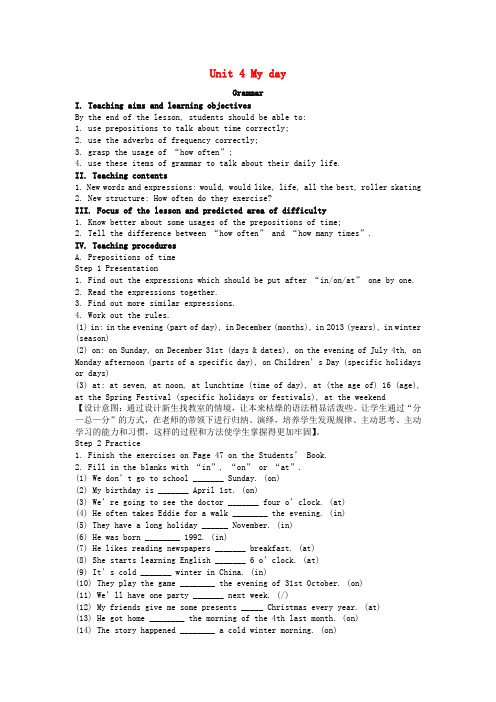
Unit 4 My dayGrammarI. Teaching aims and learning objectivesBy the end of the lesson, students should be able to:1. use prepositions to talk about time correctly;2. use the adverbs of frequency correctly;3. grasp the usage of “how often”;4. use these items of grammar to talk about their daily life.II. Teaching contents1. New words and expressions: would, would like, life, all the best, roller skating2. New structure: How often do they exercise?III. Focus of the lesson and predicted area of difficulty1. Know better about some usages of the prepositions of time;2. Tell the difference between “how often” and “how many times”.IV. Teaching proceduresA. Prepositions of timeStep 1 Presentation1. Find out the expressions which should be put after “in/on/at” one by one.2. Read the expressions together.3. Find out more similar expressions.4. Work out the rules.(1) in: in the evening (part of day), in December (months), in 2013 (years), in winter (season)(2) on: on Sunday, on December 31st (days & dates), on the evening of July 4th, on Monday afternoon (parts of a specific day), on Children’s Day (specific holidays or days)(3) at: at seven, at noon, at lunchtime (time of day), at (the age of) 16 (age), at the Spring Festival (specific holidays or festivals), at the weekend【设计意图:通过设计新生找教室的情境,让本来枯燥的语法稍显活泼些。
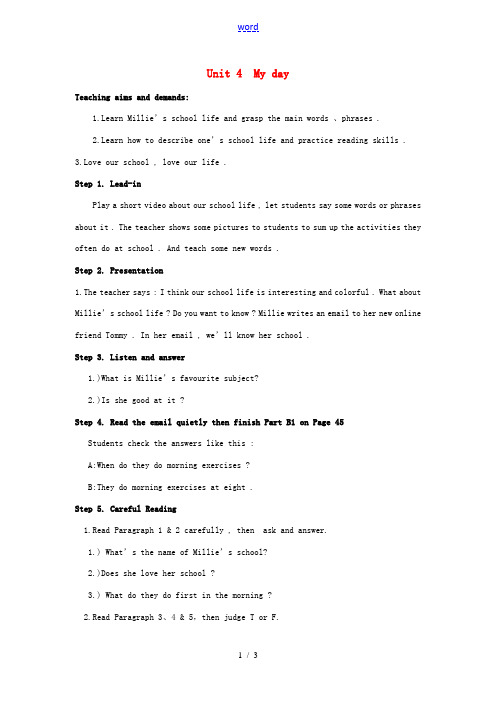
Unit 4 My dayTeaching aims and demands:1.Learn Millie’s school life and grasp the main words 、phrases .2.Learn how to describe one’s school life and practice reading skills .3.Love our school , love our life .Step 1. Lead-inPlay a short video about our school life , let students say some words or phrases about it . The teacher shows some pictures to students to sum up the activities they often do at school . And teach some new words .Step 2. Presentation1.The teacher says : I think our school life is interesting and colorful . What about Millie’s school life ? Do you want to know ? Millie writes an email to her new online friend Tommy . In her email , we’ll know her school .Step 3. Listen and answer1.)What is Millie’s favourite subject?2.)Is she good at it ?Step 4. Read the email quietly then finish Part B1 on Page 45Students check the answers like this :A:When do they do morning exercises ?B:They do morning exercises at eight .Step 5. Careful Reading1.Read Paragraph 1 & 2 carefully , then ask and answer.1.) What’s the name of Millie’s school?2.)Does she love her school ?3.) What do they do first in the morning ?2.Read Paragraph 3、4 & 5,then judge T or F.1.)Millie seldom chats with her friends after class.2.)Millie only goes to the Reading Club on Tuesday.3.)Millie is a member of the school swimming team.Step 6. Play a gameStep 7. Practiceplete Millie's school life .(方框选词填空)in the afternoon, have a good time, chat with,play in the playground, practise, nice ,start,Millie is a new student at SunshineMiddle School . Her school ________at 8:00in the morning . Millie has a lot of friends at School . They are all ______ toher . After class , they often _____________ each other or _____________________. Sometime she goes to the library________________. She often reads books in the Reading Club . She also likes playingvolleyball. She is a member of the school volleyball team.She ___________ afterschool on Wednesday afternoon . She always_______________ at her school.Step 8. ConsolidationGroup work: Can you talk about your school life .Student1 : School and lessonsStudent2 : Friends at schoolStudent3 : HobbiesStudent4 : After-school activitiesStudent5 : FeelingStep 9. Watch and discuss1.)What's the differences between our school and theirs ?2.)What do you think of their school life ?3.)What should we do ?Step 10. Homework1.Read and recite Millie’s email.2. Write something about your school life in English and then talk about it with your classmates.【课后拓展】阅读理解:Hi. I’m LingLing. I’m a student at No. 14 Secondary School. Do you want to know my life? Let me tell you about it. I usually get up at 7:00 in the morning. I have my breakfast at 7:10. My parents always prepare(准备)the breakfast for me. I go to school at 7:30. We have 7 lessons every day from Monday to Friday. I like English lesson very much. After school, I like playing ping-pong and basketball with my friends. There is a very big playground in our school.( )1. I have my breakfast at ______.A. 7:00B. 7:10C. 7:30D.7:20( )2. I have seven lessons ____.A. every dayB. at the weekendC. five days a weekD. twice a week( )3. I like ______ very much.A. EnglishB. ChineseC. art lessonD. all lessons( )4. There is a big ______ in No. 14 Secondary School.A. gardenB. libraryC. playgroundD. puter room( )5. I like playing ______ with my friends.A. ping-pong and basketballB. footballC. football and basketballD. basketball。
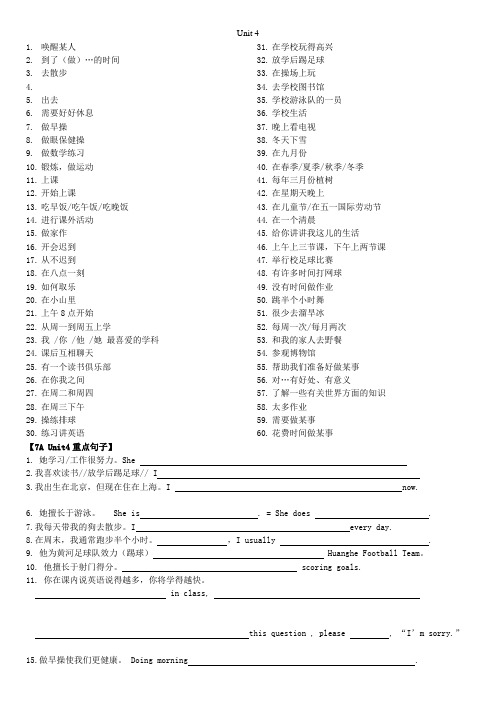
Unit 41.唤醒某人2.到了(做)…的时间3.去散步4.5.出去6.需要好好休息7.做早操8.做眼保健操9.做数学练习10.锻炼,做运动11.上课12.开始上课13.吃早饭/吃午饭/吃晚饭14.进行课外活动15.做家作16.开会迟到17.从不迟到18.在八点一刻19.如何取乐20.在小山里21.上午8点开始22.从周一到周五上学23.我 /你 /他 /她最喜爱的学科24.课后互相聊天25.有一个读书俱乐部26.在你我之间27.在周二和周四28.在周三下午29.操练排球30.练习讲英语31.在学校玩得高兴32.放学后踢足球33.在操场上玩34.去学校图书馆35.学校游泳队的一员36.学校生活37.晚上看电视38.冬天下雪39.在九月份40.在春季/夏季/秋季/冬季41.每年三月份植树42.在星期天晚上43.在儿童节/在五一国际劳动节44.在一个清晨45.给你讲讲我这儿的生活46.上午上三节课,下午上两节课47.举行校足球比赛48.有许多时间打网球49.没有时间做作业50.跳半个小时舞51.很少去溜旱冰52.每周一次/每月两次53.和我的家人去野餐54.参观博物馆55.帮助我们准备好做某事56.对…有好处、有意义57.了解一些有关世界方面的知识58.太多作业59.需要做某事60.花费时间做某事【7A Unit4重点句子】1. 她学习/工作很努力。
She2.我喜欢读书//放学后踢足球// I3.我出生在北京,但现在住在上海。
I now.6. 她擅长于游泳。
She is . = She does .7.我每天带我的狗去散步。
I every day.8.在周末,我通常跑步半个小时。
,I usually .9. 他为黄河足球队效力(踢球) Huanghe Football Team。
10. 他擅长于射门得分。
scoring goals.11. 你在课内说英语说得越多,你将学得越快。
in class,this question , please , “I’m sorry.”16.你帮助我使这个工作容易了。

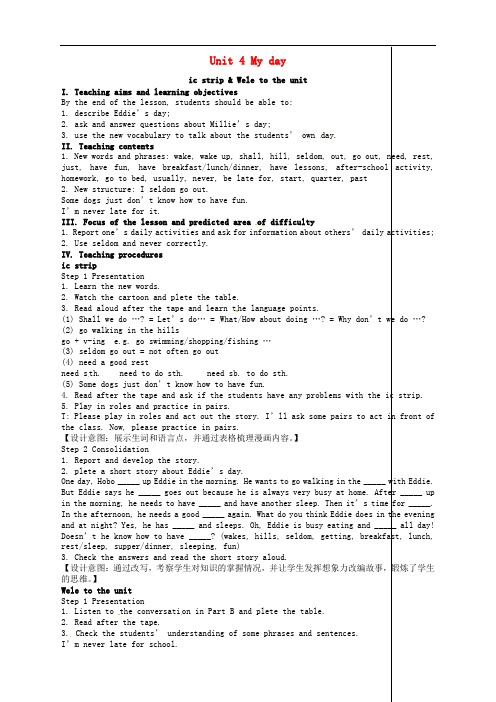
tudents’ own day.1. New words and phrases: wake, wake up, shall, hill, seldom, out, go out, need, rest, III. Focus of the lesson and predicted area3. Read aloud after the tape and learn t he language points.What/How about doing …? = Why don’t we do …? need se1. Listen to the conversati on in Part B and plete the table.start lessonsat a quarter past eightenjoy schoolT: OK, do you have any questions to ask me? “I’m never late for it.” Who can translate it into Chinese? What does “never” mean?4. Develop the conversation.【设计意图:通过书上提供的表格进行扩展练习。
】Step 2 Consolidation1. plete the passage, check the answers and read the passage aloud.T: OK, you really did a good job. Now are you clear abou t Millie’s daily activities? Please plete this short passage about Millie’s day.Millie is a hard-working student. She ______ up early in the morning. She goes to _______ at 7:20. She’s _______ late for school. Before the first lesson starts, Millie and all her classmates do morning ________. She has lunch at ten to ________. The school finishes at four ______ in the afternoon. Then it’s time for after-school ________. She always has fun. In the evening, Millie watches TV for ______ an hour. It’s her favourite time of the day. Then she needs to do her __________. She always does it carefully. She usually goes to _______ at 9:30.2. Report your day.(1) plete the table in the book abo ut the students’ own days.T: Now, I know something about Eddie’s and Millie’s days now. Next, I’d like to know about your day. Please write down the time and the activities in the table.(2) Practice reporting the students’ own da ys.T: OK, p lease try to report your day according to the table you finished just now. I’ll give you only two minutes to practice. Please try to make your report clear and interesting.(3) Ask a student to report and the other students to listen carefully.T: Time is up! Are you ready to report your day? When one student is telling about his or her day, the others should listen carefully. I will ask you questions after the report. Who’d like to be the first to tell us about your day?T: Thank … for your report. Now q uestions for the other students. Are you ready? Question 1 …【设计意图:让学生结合自己的实际情况练习,达到学以致用。
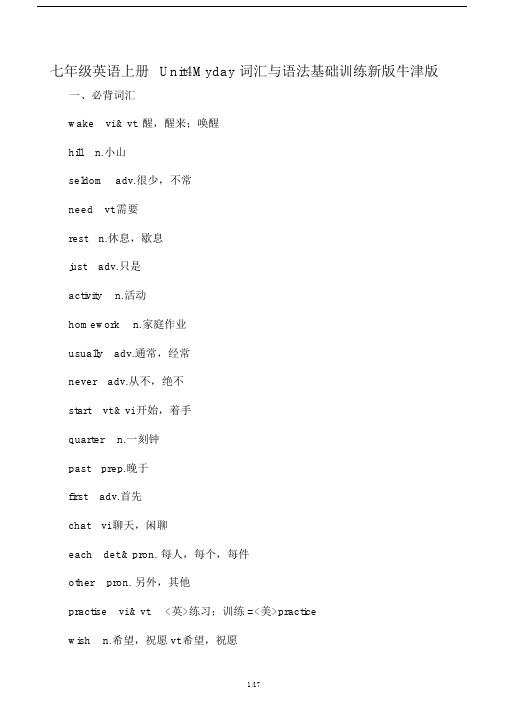
七年级英语上册Unit4Myday 词汇与语法基础训练新版牛津版一、必背词汇wake vi.& vt. 醒,醒来;唤醒hill n.小山seldom adv.很少,不常need vt.需要rest n.休息,歇息just adv.只是activity n.活动homework n.家庭作业usually adv.通常,经常never adv.从不,绝不start vt.& vi.开始,着手quarter n.一刻钟past prep.晚于first adv.首先chat vi.聊天,闲聊each det.& pron. 每人,每个,每件other pron. 另外,其他practise vi.& vt. <英>练习;训练 =<美>practicewish n.希望,祝愿 vt.希望,祝愿life n.(pl. lives)生活;生命luck n.好运,荣幸museum n.博物馆twice adv.两次picnic n.野餐once adv.一次dislike n.不喜爱,厌恶reason n.原因,理由ready adj.准备好,准备完毕learn vt.& vi. 学,学习,学会world n.世界二、重点词汇1.seldom adverb /?seld?m/almost never很少;几乎从来没有例句:Now that we have a baby, we seldom get the chance to go tothe cinema.有了孩子以后,我们很少有机会看电影了。
We seldom receive any apology when mistakes are made出.错的时候,我们很少听到道歉的话语。
2. activity noun /?k?t?v?ti/the situation in which a lot of things are happening orpeople are moving around活跃;繁冗;热烈例句:Therewasalotofactivityinpreparationforthe Queen“ svisit.大家都在为准备迎接女王来访而冗忙。
7A Unit 4知识点梳理(上)课堂导入知识点梳理一.词汇&短语:WORDS&PHRASES1. Wake up, Eddie! 醒醒,埃迪!Wake意为“醒来;把……叫醒”。
你早上几点醒来?What time do you usually wake up in the morning?现在七点了,把他们叫醒。
It’s 7:00 a.m. Now. Wake them up, please.【拓展】wake up表示“把………叫醒”时,要注意宾语的位置。
①宾语是名词时,可以放在wake和up之间或wake up之后。
叫醒你的哥哥Wake up your elder brother=wake your elder brother up②宾语是人称代词(宾格)时,只能放在wake和up之间。
把他叫醒(√)wake him up (×)wake up him2. Is it time for breakfast?到吃早饭的时间了吗?句型“It’s time for+名词. ”意为“是做某事的时间了,该做某事了”,相当于“It’s time to+动词原型”。
上课的时间到了。
It’s time for class.= It’s time to have a class.3. I seldom go out.我很少外出。
①seldom副词,意为“很少,不常,难得”其反义词是often,意为“经常”。
seldom通常至于行为动词之前,助动词、情态动词或be动词之后,是一个表示否定意义的副词。
布朗夫人很少外出。
Mrs Brown seldom goes out.米莉上学很少迟到。
Millie is seldom late for school.②go out意为“出去”。
咱们出去散步吧。
Let's go out for a walk.4. Some dogs just don'T know how to have fun.有些狗就是不知道怎样玩乐。
Unit 4 My dayTeaching aims and demands:1.Learn Millie’s school life and grasp the main words 、phrases .2.Learn how to describe one’s school life and practice reading skills .3.Love our school , love our life .Step 1. Lead-inPlay a short video about our school life , let students say some words or phrases about it . The teacher shows some pictures to students to sum up the activities they often do at school . And teach some new words .Step 2. Presentation1.The teacher says : I think our school life is interesting and colorful . What about Millie’s school life ? Do you want to know ? Millie writes an email to her new online friend Tommy . In her email , we’ll know her school .Step 3. Listen and answer1.)What is Millie’s favourite subject?2.)Is she good at it ?Step 4. Read the email quietly then finish Part B1 on Page 45Students check the answers like this :A:When do they do morning exercises ?B:They do morning exercises at eight .Step 5. Careful Reading1.Read Paragraph 1 & 2 carefully , then ask and answer.1.) What’s the name of Millie’s school?2.)Does she love her school ?3.) What do they do first in the morning ?2.Read Paragraph 3、4 & 5,then judge T or F.1.)Millie seldom chats with her friends after class.2.)Millie only goes to the Reading Club on Tuesday.3.)Millie is a member of the school swimming team.Step 6. Play a gameStep 7. PracticeComplete Millie's school life .(方框选词填空)in the afternoon, have a good time, chat with,play in the playground, practise, nice ,start,Millie is a new student at Sunshine Middle School . Her school ________at 8:00in the morning . Millie has a lot of friends at School . They are all ______ toher . After class , they often _____________ each other or _____________________. Sometime she goes to the library________________. She often reads books in the Reading Club . She also likes playingvolleyball. She is a member of the school volleyball team.She ___________ afterschool on Wednesday afternoon . She always_______________ at her school.Step 8. ConsolidationGroup work: Can you talk about your school life .Student1 : School and lessonsStudent2 : Friends at schoolStudent3 : HobbiesStudent4 : After-school activitiesStudent5 : FeelingStep 9. Watch and discuss1.)What's the differences between our school and theirs ?2.)What do you think of their school life ?3.)What should we do ?Step 10. Homework1.Read and recite Millie’s email.2. Write something about your school life in English and then talk about it withyour classmates.【课后拓展】阅读理解:Hi. I’m LingLing. I’m a studen t at No. 14 Secondary School. Do you want to knowmy life? Let me tell you about it. I usually get up at 7:00 in the morning. I have my breakfast at 7:10. My parents always prepare(准备)the breakfast for me. I go to school at 7:30. We have 7 lessons every day f rom Monday to Friday. I like English lesson very much. After school, I like playing ping-pong and basketball with my friends. There is a very big playground in our school.( )1. I have my br eakfast at ______.A. 7:00B. 7:10C. 7:30D.7:20( )2. I have seven lessons ____.A. every dayB. at the weekendC. five days a weekD. twice a week( )3. I like ______ very much.A. EnglishB. ChineseC. art lessonD. all lessons( )4. There is a big ______ in No. 14 Secondary School.A. gardenB. libraryC. playgroundD. computer room( )5. I li ke playing ______ with my friends.A. ping-pong and basketballB. footballC. football and basketballD. basketball。
七年级英语上册Unit4Myday教案Unit 4 My day Teaching aims1.Learn to talk about daily activities in English2.Learn the new wordsStep 1. Lead-in1.What time do you usually get up?2.When do you go to school every day? Step 2. PresentationLearn some new wordswake up 醒来seldom adv. 很少need vt&n需要have fun 玩得高兴activity 活动homewok 家庭作业usually adv. 通常start vt&vi开始quarter n.四分之一past perp.经过never adv.从不be late for 迟到Step 3 Look and answerWhat is Eddie doing?Ste p 4 Listen and anwer1 .What is Hobo doing?2. What does Eddie do after breakfast?3. What does he do after lunch?4. What does he do after lunch?Step 5 Read and actFree Talk:Do you want to be a lazy student?Step 6 Ask and answer1.What do we often do at school?2.What do we do at home?do morning exercise s have lessonsdo after-school activities get upeat breakfast/lunch/supper go to beddo homework watch TVStep 7 Look at Millie’s dailyStep 8 Let’s have a talk-- What time does Millie get up?-- She _____________________-- What does she do at 7.30 a.m.?-- She _____________________Step 9.Talk about your daily activities:1.Finish the form on page 43.2.Try to say something about your own daily activities like that:Hi, I’m _______. I’m _____ years old.I study at _______________.I __________. In the morning, I ____________________Step 10.Listen and answer1.When does Millie go to school every day?2..What time does Millie start lessons every day?Step 11.Read and actStep /doc/7510957433.html,nguage pointsStep 13.Exercises:1.翻译下列词组2.用所给词的适当形式填空3.选词填空4.完成下列句子Homework1. Act the conversation in pairs after class.2. Preview the new words in Reading.ReadingTeaching aims:1. Identify specific information about school life and activities2. Practise reading skills by learning Millie’s article.3.Learn the new wordsStep 1 Lead-inA story about FrankStep 2. Discussion1.Do you like your school?2.What do you think of your school life?3.What do you often do at school?Step 3.Talk about your school life1. What do you think of your school?2. When does your school day start?3. Do you do morning exercises at school? When?4. When do you begin your lessons?5. What are your favourite lessons?6. What is your favourite sport?Step 4.Read and learn some new wordsin the morning/afternoon/evening 在上午/下午/晚上favourite adj.最喜爱的from…to… 从…到…first adv. 首先chat vi.聊天practise vt/vi练习have a good time 玩得高兴best a dj./ad v. 最好的wish n.祝愿Step 5.Read and answerW h ich is Millie’s favourite subject?Step 6 Finish B1 and B2 then check answersStep 7 Read after the tape then finish more exercisesStep 8 Finish B3 and C then check answe rsStep 9 Phrases and language points in the articleStep 10TaskRetell Millie’s sch ool lifeStep 11 Interview then give a short speechbe a student at, start , from…to…, do morning exercises, lessons begin, favourite subject, be good atfriends, be nice to, chat withlibrary, a Reading Club, read books, like playing volleyball , be in,have a good timeStep 12 HomeworkWrite about your school lifeGrammarTeaching Aims:.Learn the use of prepositions of time and adverbs of freque ncyStep1 Lead-inIt is very cold in winterChildren’s Day i s on June 1st.They do morning exercises at 8 o’clockStep2 Present the use of preposition of timeWe use in before parts of the day、months 、seasons、years.We use on before days、 dates 、special holidays、 parts of a special day.We use at before time of day、 age.Step3 Explan the use of preposition of timein 用于泛指一天的各个部分,月份,季节及年份on用于表示具体的某一天at用于表示具体钟表上的时间、年龄Step4 ExercisesFinish the exercises on page 47 then check answers.Fill in the blanks with in、 on、 atStep5 Present the adverb of frequencynever 、 seldom 、 sometimes 、 often 、 usually 、 always Step6 Look at the pictures and fill in the blanks.频率由高到低为 always usually often sometimes seldom never Step7 Complete the exercises on page 48 then check answers.Step8 Work in pairs and talk about your diets.What do you have for breakfast/ lunch/ dinner?I always/ usually/ often/ sometimes/ seldom/ never have…for my breakfast/ lunch/ dinner.Do you always/ usually/ often/ sometimes/ seldom/ never have… for…?What about you?Step9 Finish more exercises一根据首字母及句意思补全单词二对画线部分提问三比较下列句子Step10 Homework1. Remember the new words in this lesson.2. Finish all the exercises about grammar.Integrated skillsTeaching aims:1. Learn about something about volleyball matches2. Practise listening skills by listen to a conversation.Step1 RevisionStep2 Free talkWhich sport do you like best? Why?Step3 PresentationIf you want to watch a match,you should know the following four questions.What are the teams in the match?When is the match?Where is the match?How can we go to watch the match?Step4 Exercises1. Listen and TickFinish the exercises on page 49 and the check answers2. Listen anf FillListen again and complete Millie’s notes(P49 A2&P50 A3)Step5 Explanationhope to do sth/ hope+从句Step6 Homework1) Learn new words and phrases by heart.2) Preview next lesson.Speak up and Study skillsTeaching aims:1.Practise speaking skills by talking about an activity at school.2.Learn some vowels.Step 1 Presentation1、Listen and answer:What are they talking about?2、Read and answer1)Is there a football match this Saturday afternoon?2)Where does Millie have the match?3)How often does Millie have this kind of match?4)Does Millie often practise at school?Step2 Read after the tapeStep3 Explanation1) How often2) practise doing sth.Step4 Make a dialogues1) Talk about an activity at your school with your friends. Use Tommy andMillie’s conversation as a model.2) Act out the dialogues.Step5 Vowels1) Listen to the words and find out the rules.2)Read some words .Then put them under the correct sound groups.3) Read some words.Step6 Read some phrases loudly.Step7 Homework1)Prepare a dialougue to tell your friends about your school life. Use Tommyand Millie’s conversation as a model.2)Review the vowels we have learnt today.TaskTeaching aims:1.Write about S s’ own favourite sports.. 2.Review the important points in this unit.Step1 Look and answerLook at Millie’s happiness chart then answerWhat activities does Millie love?Why?What activities does Millie like?Why?What activities does Mille dislike?Why?Step2 TaskWrite about your school life with the help of these useful expressions.I like/don’t like …My favourite subject(s) is/are …I can learn a lot about …It helps me …It is fun/i nteresting.I cannot … so …We al ways have …Step3 Fill in the blanksStep4 Explanationshelp sb. to do sth.get/be ready forStep5 Translate some phrases1)、我们都已经为考试做好了准备。